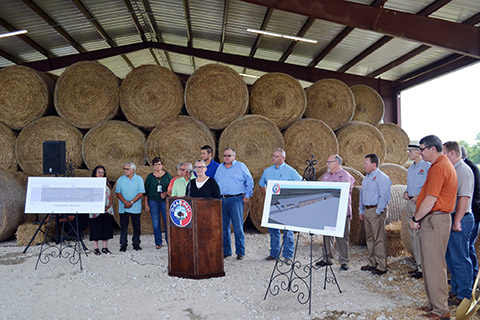
FAYETTEVILLE, Ark. – The Quapaw Tribe is building a meat-processing plant near Miami, Oklahoma, and faculty from the University of Arkansas Dale Bumpers College of Agricultural, Food and Life Sciences and School of Law are collaborating to assist in the design and construction of the facility.
The plant, expected to be operational in May, 2017, will also provide U of A students with opportunities for experience and training.
Harold L. Goodwin, a professor and senior economist for Bumpers College, and Janie Hipp, director of the Indigenous Food and Agriculture Initiative in the School of Law, are helping with the business structure and completion of regulatory procedures. Mike Looper, head of Bumpers College’s Department of Animal Science, and Jason Apple, a professor of animal science, have provided input on design of the plant.
“It is envisioned there would be availability of the facilities for meat judging and grading training, and also for food safety and meat processing training,” said Goodwin, who also works with the Indigenous Food and Agriculture Initiative. “Most likely, students involved would be from animal science and food science.”
Hipp said many Native American tribes have traditional cultural ties to food production.
“If you go back into individual tribes’ history on this continent, particularly before European contact, there were massive levels of food production,” said Hipp, who is a citizen of the Chickasaw Nation. “Tribes were not just hunting and gathering as ancient peoples on this continent. Many tribes were involved in food production historically and remain deeply involved in food and agriculture today. Tribes all across the United States have a rich history in food production and the Quapaw Tribe’s move into food processing and food science is an exciting next step.”
The plant will include a classroom, laboratory and test kitchen, and is being designed to process up to 50 animals per week.
“We have great expertise in meat and food science at U of A and are the center of expertise for tribal agriculture and food because of the Indigenous Food and Agriculture Initiative,” said Goodwin. “The proximity of the plant to Fayetteville (about 90 minutes away) makes it ideal for joint collaboration between the first U.S. Department of Agriculture-certified beef and bison processing facility owned by a Native American tribe and a land-grant university.”
“It’s about building an economy that’s agriculture-based that will support local businesses and feed local people, we’re hoping,” said John Berrey, chair of the Quapaw Tribe, a 1991 U of A graduate and member of the alumni association’s National Board of Directors. “Really it’s about taking advantage of our region and all the agriculture that takes place in this region. It’s a business opportunity for sure. It gives us an outlet for our beef products. It also gives us opportunity to take other peoples’ product and process it. It’s both community development and economic development for the tribe.”
The tribe has cattle and bison on a ranch outside Miami. The ultimate goal of the ranch is to raise, slaughter, process, package and ship its own products to local businesses and stores, including the tribe’s restaurants in Quapaw Casino and Downstream Casino Resort.
“Regaining our health in Indian Country is very important,” said Hipp. “You’ve got to have access to foods that are healthy and that are readily available. Investment in local infrastructure to make healthy foods more readily available is part of an important step in healthy food access. Without that infrastructure, tribes, which live in remote areas, are literally just waiting for that next truck to go by.”
Cost of construction is $1 million with $800,000 provided by the U.S. Department of Housing and Urban Development in grant funds. The tribe has applied for additional grants to help pay for equipment at the plant.
The tribe is also partnering with Northeastern Oklahoma A&M College, Oklahoma State University and Missouri State University.
About the Dale Bumpers College of Agricultural, Food and Life Sciences: Bumpers College provides life-changing opportunities to position and prepare graduates who will be leaders in the businesses associated with foods, family, the environment, agriculture, sustainability and human quality of life; and who will be first-choice candidates of employers looking for leaders, innovators, policy makers and entrepreneurs.
About the University of Arkansas School of Law: The School of Law prepares students for success through a challenging curriculum taught by nationally recognized faculty, unique service opportunities and a close-knit community that puts students first. The school has been ranked among the top 10 "Values in Legal Education" by the National Jurist magazine for four consecutive years and is among the top 46 public law schools, according to U.S. News and World Report.
About the Indigenous Food and Agriculture Initiative: The Indigenous Food and Agriculture Initiative enhances health and wellness in tribal communities by advancing healthy food systems, diversified economic development and cultural food traditions in Indian Country. The initiative empowers tribal governments, farmers, ranchers and food businesses by providing strategic planning and technical assistance; by creating new academic and professional education programs in food systems and agriculture; and by increasing student enrollment in land grant universities in food and agricultural related disciplines.
About the University of Arkansas: The University of Arkansas provides an internationally competitive education for undergraduate and graduate students in more than 200 academic programs.
Topics
Contacts
Taylor LaCour, Communications Intern
Dale Bumpers College of Agriculture, Food and Life Sciences
479-575-4625,